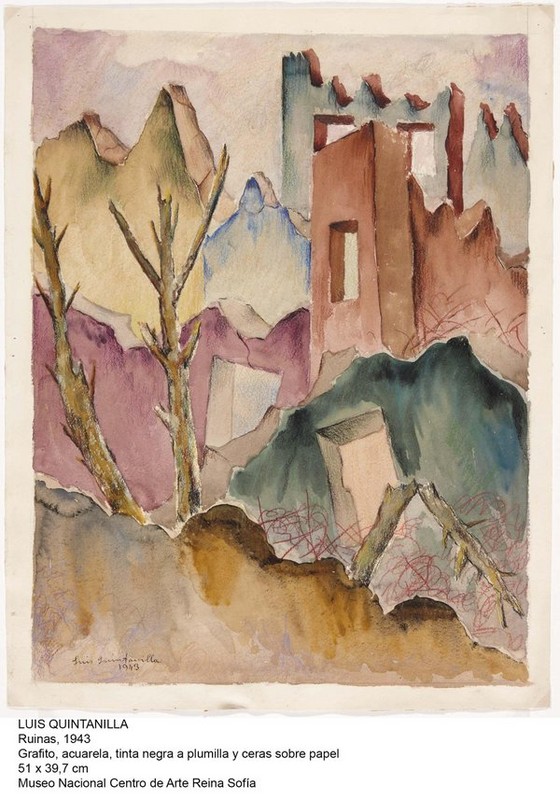Campo Cerrado
26 Apr - 26 Sep 2016
CAMPO CERRADO
Spanish Art 1939–1953
26 April - 26 September 2016
The exhibition Campo Cerrado takes its name from the homonymous novel by Max Aub and looks to examine Spanish art in the complex and controversial 1940s, a decade that has received little attention and one that exists in a critical and historiographical vacuum, despite its importance in structuring modern sensibility in Spain.
In 1938, at the height of the Civil War, Eugenio d’Ors, General Director of Fine Arts, selected works by Spanish artists linked to the art that preceded the conflict, including Zuloaga, representing Spain’s fascist camp at the Venice Biennale. In 1951, the writer and critic Rafael Santos Torroella and architect José Antonio Coderch designed the Spanish Pavilion for the IX Milan Triennale, thus setting up a dialogue between popular craftsmanship and contemporary design which included both Lorca’s poetry and the paintings of a young Guinovart. The comparison between the contents of Spain’s representations at both international events, which could bee seen as symbolic boundaries in this exhibition, could also evoke a linear evolution ranging from the most academic conservatism, in line with the rigours of early fascism, to the opening out of modernity, in keeping with a political time that strived to put an end to the international isolation of the France regime. Nevertheless, the analysis of how much lies beneath, not only in both exhibitions but also in the intervening time between the two, reveals an infinitely more complex reality.
In order to reconstruct that period, the exhibition is divided into the following sections, which will combine wide-ranging views with case studies: 1939; image and propaganda; from the restoration of academic art to renewal: Eugenio d’Ors; the country and the city: aspects of daily life in autarchic Spain; exiles and expatriates; the return of Miró and the rescue of avant-garde movements in history; from the Escuela de Altamira and Dau al Set; architectural renovation; the abstraction-figuration debate and the official appropriation of the modern.
Spanish Art 1939–1953
26 April - 26 September 2016
The exhibition Campo Cerrado takes its name from the homonymous novel by Max Aub and looks to examine Spanish art in the complex and controversial 1940s, a decade that has received little attention and one that exists in a critical and historiographical vacuum, despite its importance in structuring modern sensibility in Spain.
In 1938, at the height of the Civil War, Eugenio d’Ors, General Director of Fine Arts, selected works by Spanish artists linked to the art that preceded the conflict, including Zuloaga, representing Spain’s fascist camp at the Venice Biennale. In 1951, the writer and critic Rafael Santos Torroella and architect José Antonio Coderch designed the Spanish Pavilion for the IX Milan Triennale, thus setting up a dialogue between popular craftsmanship and contemporary design which included both Lorca’s poetry and the paintings of a young Guinovart. The comparison between the contents of Spain’s representations at both international events, which could bee seen as symbolic boundaries in this exhibition, could also evoke a linear evolution ranging from the most academic conservatism, in line with the rigours of early fascism, to the opening out of modernity, in keeping with a political time that strived to put an end to the international isolation of the France regime. Nevertheless, the analysis of how much lies beneath, not only in both exhibitions but also in the intervening time between the two, reveals an infinitely more complex reality.
In order to reconstruct that period, the exhibition is divided into the following sections, which will combine wide-ranging views with case studies: 1939; image and propaganda; from the restoration of academic art to renewal: Eugenio d’Ors; the country and the city: aspects of daily life in autarchic Spain; exiles and expatriates; the return of Miró and the rescue of avant-garde movements in history; from the Escuela de Altamira and Dau al Set; architectural renovation; the abstraction-figuration debate and the official appropriation of the modern.

